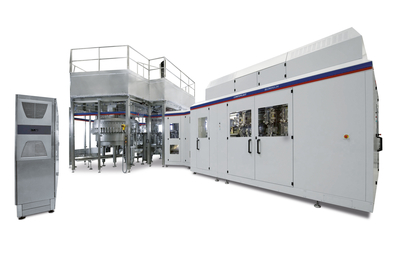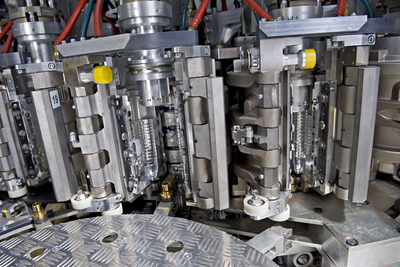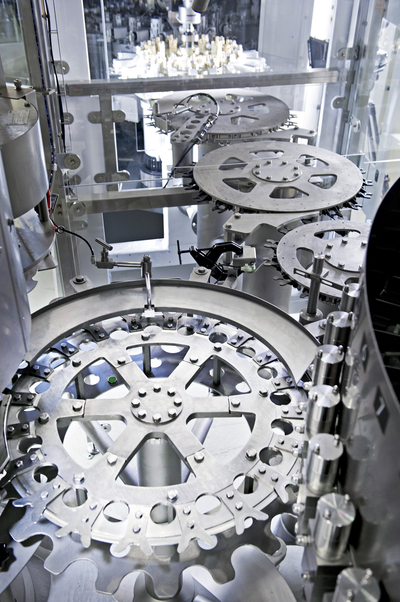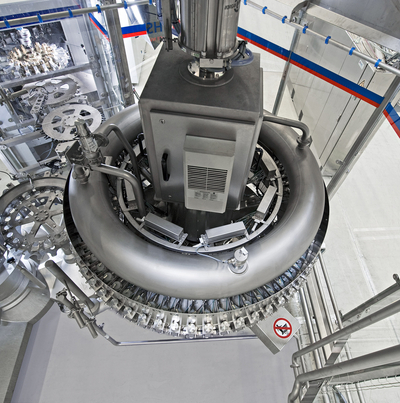
Reduced investment and production costs, increased line efficiency, minimized space requirements, and lower operator involvement
The InnoPET BloFill monoblock is on the up and up and now has half-load option
Frank Haesendonckx*
In the beverage industry, cutting costs for containers and for filling and packaging technology as a whole is becoming more and more important. At the same time, the top quality of the product must not be allowed to suffer. With this in mind, KHS has now come up with a system specially designed for the manufacture, filling, and capping of PET bottles that meets the requirements of the industry in every respect. The machinery in focus here is the recently developed InnoPET BloFill, a monoblocked stretch blow molder/filler/capper that not only has a number of cost advantages but also many other plus points. One new feature of this beneficial monoblock setup is that it can now be run at half load. This means greater flexibility in production and a drop in investment costs.
Air conveyor and rinser no longer required
Traditionally, the PET bottles produced on the InnoPET Blomax stretch blow molder are transported to the filler via air conveying segments. Using an InnoPET BloFill – and thus directly monoblocking the stretch blow molder and filler/capper system – eliminates the need for these air conveyors. Besides specifically saving on the expense of an air conveyor, plus the fact that less space is required as the air conveying segment is now superfluous, the system also has the advantage of gentler PET bottle handling. Accumulation pressure that can occur when PET bottles are air conveyed is no longer an issue. Line efficiency is also increased by doing away with an extra component (the air conveyor). What's more, because PET bottles no longer run the risk of becoming contaminated in the InnoPET BloFill thanks to the machines being directly monoblocked to one another, a rinsing system also becomes redundant, in turn generating another major cost-cutting factor.
* Product Manager, InnoPET Blomax Stretch Blow Molders, KHS Corpoplast GmbH & Co. KG, Hamburg
Ideally suitable for the widest range of different bottle designs and processing capacities
The InnoPET BloFill system is suitable for processing the widest possible variety of bottle sizes and shapes. It can cope with anything from the 0.2-liter to the 2-liter PET bottle. On request, special formats can also be processed. The capacity of the InnoPET BloFill monoblock is geared towards the output of the blow molder – which is the lead machine. Capacities of up to 43,200 bottles per hour are possible.
Practically every product fillable
Within the InnoPET BloFill concept, InnoPET Blomax stretch blow molders can be monoblocked with all KHS filler systems designed for the filling of PET bottles. As KHS has the right PET filler system for every type of beverage, the InnoPET BloFill monoblock concept can be used to process a very diverse range of beverage types. Whether beer, carbonated or still non-alcoholic beverages, or even sensitive fruit and milk beverages are to be bottled in PET, almost anything is possible.
Bottles & Shapes™: consultancy starts with PET bottle design
As with classic filling lines, before the customer invests in an InnoPET BloFill system, KHS provides an individual consultancy service. This is followed by the drawing up of a line concept that is precisely tailored to meet the specific requirements of the particular beverage company. KHS consultants begin by providing expertise and information on PET bottle design and on the concept for the required PET bottle type. Here, the product to be filled is of primary importance, as this stipulates the necessary pressure stability and barrier properties of the PET bottles, for example. Through its Bottles & Shapes™ program, KHS Corpoplast can offer clients its full range of expertise, from design to the selection of materials, from preform design, bottle engineering to mold design, testing, and running mold trials. All of these aspects are naturally selected with regard to the filling technology and requirements the plastic bottles have to meet in production, in stores, and with the end user.
For many years, InnoPET Blomax stretch blow molders have been synonymous with the high-precision production of lightweight PET bottles. The advantages of lightweight PET bottles lie not just in the reduced costs for materials; the consumption of compressed air and heating energy during production is also greatly minimized. The InnoPET BloFill monoblock can only profit from KHS' unique, combined competences in the field of lightweight PET. One major criterion for beverage companies opting for an InnoPET BloFill system is that simply by using the monoblock concept alone, the extremely lightweight PET bottles have become even lighter. The reason for this is that in a monoblock PET bottles are all conveyed separately. There is thus no contact that can result in PET bottles 'sticking' to one another and causing congestion on the line, as is often the case with conventional air conveying between the stretch blow molder and filler.
Significant savings on bottle materials
Let's take the example of an InnoPET BloFill system with 20 cavities that processes 36,000 bottles an hour and approx. 180 million PET bottles a year. Assuming that the preform weight is reduced by two grams and the PET costs €1.20 per kilogram, this results in a yearly materials saving of over €400,000.
Half-load concept makes even more possible
In addition to packaging expertise, the capacity of a monoblocked system is also of great significance. Another interesting aspect is that in the InnoPET BloFill monoblock the stretch blow molder can be half loaded, with the result that the filler and capper system can be scaled down. The half-load option is particularly significant when various sizes of PET are to be processed.
For example, a company manufactures and fills both 0.5-liter and 1.5-liter PET bottles. An InnoPET Blomax stretch blow molder designed for a capacity of 36,000 PET bottles per hour can produce both types of PET in an almost identical period of time. In contrast, the filling system needs considerably longer for the filling of 1.5-liter PET bottles than for 0.5-liter containers. It's now possible to reduce the output of the stretch blow molder to down to 70% – with the quality of the PET bottle staying the same. For a filling system that is designed to process 36,000 0.5-liter bottles an hour, however, this reduction in performance for the designated filling into 1.5-liter bottles is not always enough. It would now be conceivable to again reduce the capacity of the stretch blow molder, for which a change of stretch cam is necessary. However, replacement of the stretch cam alone would take several hours. In view of line efficiency, the new half-load option offered by the stretch blow molder is a much more interesting option. In this setup, preforms are only assigned to every second station on the stretch blow molder.
Perfect bottle handling
The blow stations of an InnoPET Blomax Series III compact stretch blow molder are spaced approx. 350 mm apart, while the gaps between the various filling valves of the filling system are around 113 mm. Cam-controlled grippers in the transfer module between the stretch blow molder and the filler ensure that these necessary distances are shortened. At half load the distance in the stretch blow molder is altered to about 700 mm. An ingenious, specially adapted transport system only accesses every second stretch blow molding station, using gripper arms specifically designed for this purpose. The PET bottles are then transported to the filler transfer star so that all filling positions are assigned thereby enabling a continuous filling process.
The half-load concept is of particular interest to beverages companies who mainly process smaller PET bottles but occasionally also larger sizes, such as 1.5-liter PET containers. If, for example, the 0.5-liter PET bottle is the container of choice and the half-load option is selected, the filler can be set for a capacity of 36,000 0.5-liter PET bottles, and is thereby considerably smaller than with a suboptimum capacity of approx. 26,000 1.5-liter PET bottles per hour. In this case, the filler can be equipped with 25% fewer filling valves. This results in a significant reduction in the cost of investment. At the same time, 1.5-liter blow molds only have to be purchased for every second blow station on the stretch blow molder.
How the monoblock concept works
In order to better illustrate the various other features of the InnoPET BloFill monoblock, we shall first take a look at how the monoblock concept actually works. After loading, mandrels holding the preforms pass through the linear heating furnace where the preforms are heated according to a specified heating profile and then fed to the blow stations. This is where they are stretched and inflated. Next, the finished PET bottles leave the blow stations, are turned, and passed on to the transfer wheel. This is where the difference between the large pitch of the stretch blow molder and the small filler pitch is compensated for by electronically synchronizing both machines.
Integrated airlock separates wet and dry areas
Transfer wheels equipped with flexible grippers are installed on both the stretch blow and filler sides of the monoblock. What is known as an airlock is integrated at the interface of the two machines. Permanently filtered ambient air is fed into the airlock area and pre-dried if the level of humidity requires it. The airlock has a slight yet constant amount of overpressure that consistently separates the wet and dry areas thereby eliminating the risk of corrosion in the blow molder.
Cooling necessary when filling carbonated beverages
If carbonated beverages are to be filled, the integration of a cooling segment downstream of the airlock is obligatory. The reason for this is that the PET bottles have an initial temperature of approx. 70 to 75°C. When bottling carbonated beverages, the PET bottle is pressurized in the filler before being filled with liquid. This pressurization process poses a risk to the strongly heated PET bottles: bottle bases could bulge, bottles could burst during filling, and stress cracks could form in the materials.
Unique KHS cooling system
In order to ensure the bases of the PET bottles are effectively cooled, KHS uses a unique and particularly efficient cooling process. A mixture of water and air in the form of fine drops of mist is sprayed onto the bottle base using a nozzle system. Several nozzles within the system ensure that the bases are constantly wetted. The water consumption of this method of wetting is extremely low, with around five liters an hour required for a line of 36,000 bottles. As opposed to classic recooling systems based on flushing with treated water, no electricity is required for this type of water cooling.
Advantage on advantage with plenty of integrated future proofing
All in all, monoblocking a stretch blow molder with a filler and capper system is a technological approach that offers plenty of advantages. Reduced investment and production costs, increased line efficiency, minimized space requirements, and lower operator involvement: all this speaks in favor of a successful future for InnoPET BloFill systems. Nevertheless, the traditional stretch blow molder/air conveyor/filler and capper concept will continue to be in demand in future. Beverage operations with low outputs will use them, as will companies whose philosophy centers on the decoupling of machines. KHS is armed with plenty of expertise and technology to meet all kinds of customer requirements and production policies. With its Life Cycle Solutions, KHS is to hand during the life cycle of a customer's machinery and plant engineering, with the aim of ensuring continuously efficient and economic operation of a line throughout its entire lifespan.




